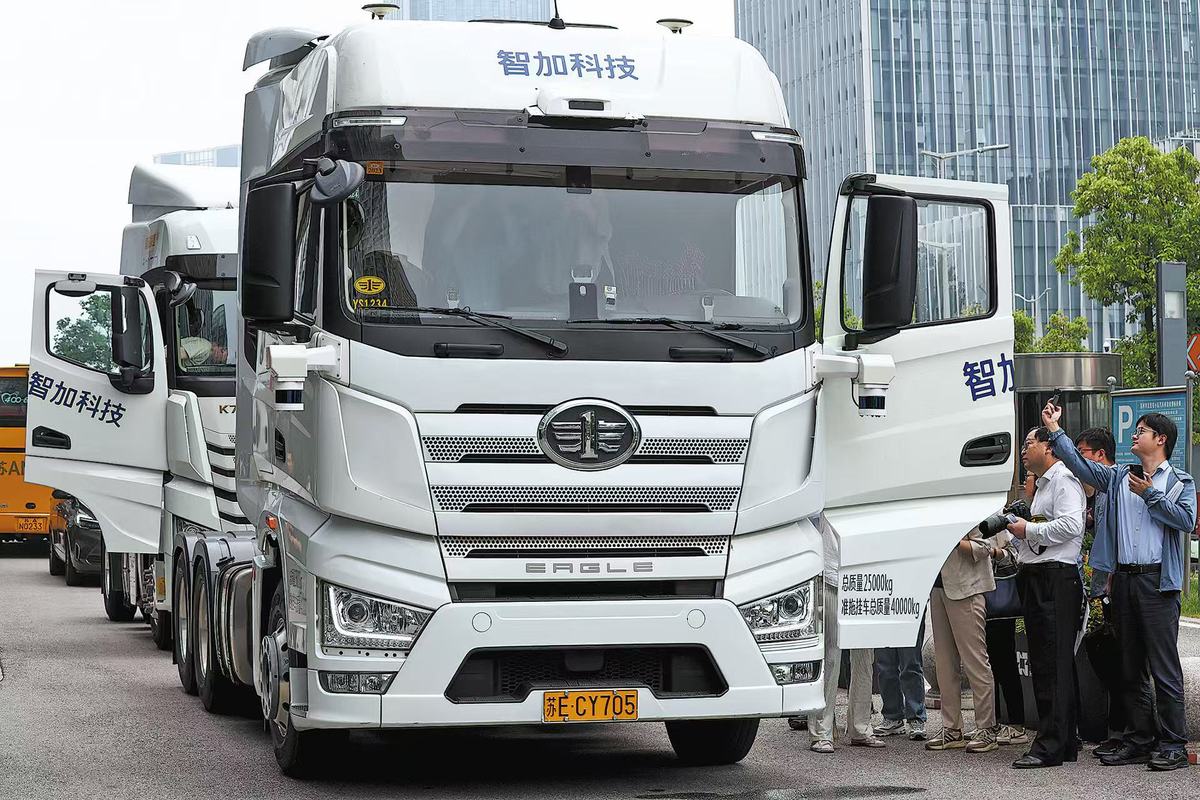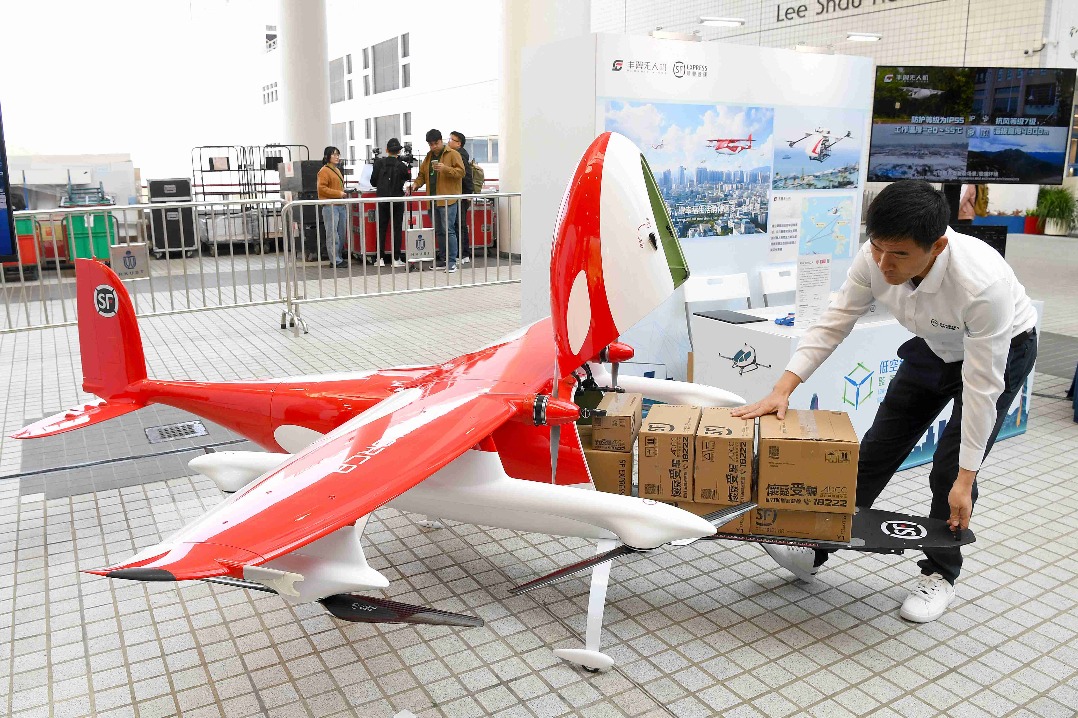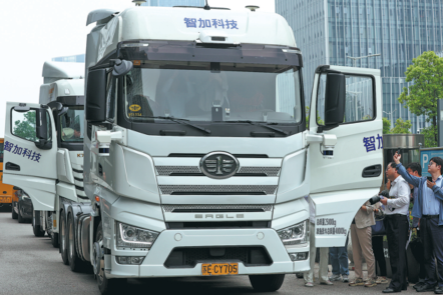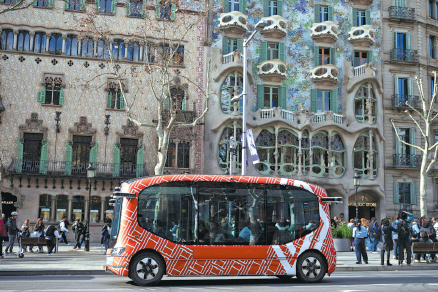Driverless trucks show way of future transport


The commercial use of autonomous trucks is gaining momentum in the logistics sector as Chinese self-driving firms accelerate steps to conduct road tests and mass-produce autonomous heavy-duty trucks driven by rising demand for faster freight delivery.
China's autonomous driving company Pony.ai announced that it has been granted permission to carry out cross-provincial expressway testing of unmanned truck platoons, the first such testing in China.
The platoons, led by manned vehicles, have begun self-driving freight-service testing on the Beijing-Tianjin-Tanggu expressway. As part of its strategic roadmap, Pony.ai aims to achieve full autonomy for all trucks in future platoons, further driving down logistics costs for autonomous trucking.
Pony.ai's autonomous trucks, which transport goods daily between Beijing and Tianjin, have delivered nearly 500 twenty-foot equivalent units of freight orders and accumulated over 45,000 kilometers of autonomous driving mileage on this route. A TEU is a widely used unit of measurement in the shipping business.
Its autonomous truck operations have evolved from early-stage road testing to commercial operations with autonomous platoons. The company said it will focus on achieving fully driverless fleets to drive the mass commercialization of autonomous trucks.
By the end of 2024, Pony.ai's autonomous trucks had accumulated more than 5 million km of road testing mileage, and serviced more than 860 million freight ton-kilometers.
Jiang Zheng, an expert at the research and development center affiliated with GAC Group, said compared with self-driving passenger-carrying robotaxis, the routes of autonomous trucks are more fixed, and there are no traffic lights or passengers once they get on expressways, thus providing more ideal conditions for the large-scale commercialization of autonomous driving technology.
"Logistics companies see rising demand for autonomous trucks, which can help improve transportation efficiency, lower the costs of labor and delivery, and liberate people from repetitive and low-value physical labor," said Jiang, adding that he is bullish on autonomous truck prospects.
According to a report by Beijing-based think tank EqualOcean, the number of heavy-duty trucks in China's logistics system is expected to reach 6.27 million in 2030, with revenue from autonomous trucks hitting 853.9 billion yuan ($118.3 billion) by then.
Global consultancy McKinsey & Company expects the global autonomous heavy-duty trucking market to reach $616 billion by 2035, with China, the United States and Europe contributing $327 billion, $178 billion and $112 billion, respectively.
Chinese autonomous trucking startup Zhijia Technology is speeding up the testing and deployment of its autonomous driving technology. The company has obtained the nation's first license to conduct tests for its heavy-duty autonomous trucks on open roads.
It has successfully completed the world's first demonstration operation on the Suzhou-Taizhou expressway S17, demonstrating the safety and reliability of its autonomous heavy-duty truck technology on actual road conditions.
Rong Li, CEO of Zhijia Technology, said the company hopes to help reduce delivery costs, make long-haul logistics safer and address the shortage of truck drivers.
The company has delivered its intelligent heavy-duty truck K7+, equipped with advanced autonomous driving systems, to a batch of domestic logistics and delivery companies through collaboration with Chinese automaker JAC Group.
Moreover, it has finished the industry's first warehouse-to-warehouse unmanned trucking test. The test route began at a major e-commerce logistics park in Huangshi, Hubei province, passing through urban areas and multilane highways, and concluded at a large storage center within a freight airport.
Autonomous trucks are mainly tested or applied in relatively simple scenarios, such as expressways, ports, mines and some closed parks, and equipped with advanced sensors, radars and camera systems, said Zhang Xiang, a visiting professor at the engineering department of Huanghe Science and Technology University.
Zhang said the application of self-driving heavy-duty trucks in the logistics sector will elevate transportation safety, shorten the delivery time of goods, and lower the operating costs of logistics companies.
However, there are still some difficulties and challenges in promoting the large-scale commercial use of self-driving trucks, as it is difficult for authorities to manage long-haul trucks, whose operational range covers several provinces, he added.




































